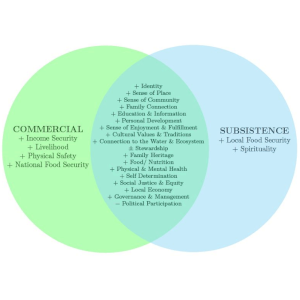Integrated ecosystem assessment (IEA) is a framework that organizes and summarizes science to aid in the transition from a traditional single sector toward a holistic management approach known as ecosystem-based management (EBM). An essential step of the IEA framework is the development of conceptual models. These models allow the integration of intrinsically linked social, environmental, and biological components of marine ecosystems that is pivotal to address unsolved questions in fisheries management. We constructed social-ecological conceptual models of relevant commercial and subsistence fisheries for Sitka, a fisheries-based community in Southeast Alaska, by collecting and synthesizing available scientific information, local ecological knowledge (LEK), and qualitative information. We conducted focus groups with key informants in Sitka who had in-depth knowledge of their community’s interactions with local fisheries and the structure and function of the surrounding ecosystem. The resulting conceptual models coproduced by scientists and Sitka stakeholders, illustrate the main biological and environmental factors driving the abundance of Pacific halibut (Hippoglossus stenolepis) and Pacific herring (Clupea pallasii) in Southeast Alaska. Furthermore, these coproduced models elucidate how the interaction between Sitka residents and these fisheries affect community well-being. Our models will serve as the basis to assess EBM objectives for Sitka as part of an IEA place-based framework. This study also highlights the importance of integrating LEK into science and potentially into the broader Alaska fisheries management structure.
Development of social-ecological conceptual models as the basis for an integrated ecosystem assessment framework in Southeast Alaska
Publication date
September 22, 2019
Abstract
Journal
Ecology and Society
Region
Alaska


